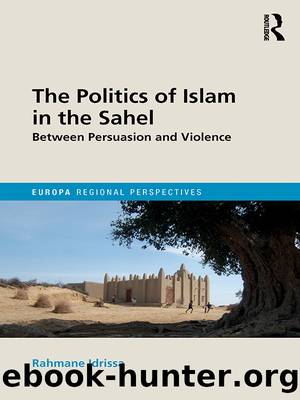The Politics of Islam in the Sahel: Between Persuasion and Violence by Rahmane Idrissa

Author:Rahmane Idrissa [Idrissa, Rahmane]
Language: eng
Format: epub
Tags: Religion, Religious Intolerance; Persecution & Conflict, African, Social Science, Peace, Political Science, World, Reference, Islamic Studies, Islam, Terrorism, General
ISBN: 9781351981965
Google: w_8nDwAAQBAJ
Goodreads: 35542359
Publisher: Routledge
Published: 2017-06-14T12:36:16+00:00
Radical manoeuvres and âsoft fanaticismâ
The élitist and network-based nature of Salafi reformism shows in the central orientations of their ideas, which focus on three objects of criticism: the West, state secularism and moral decadence. Beyond this negative stance, the networks share in common the objective of building a new Islamic identity for Senegal, one which implicitly or explicitly rejects the confrérie model. Substantively, the insistence on Senegalâs Islamic identity is a bid for promoting a religious society â that is, a society in which religious norms are hegemonic and leadership roles are determined by religious credentials â with opponents being the promoters of a civil society in Senegal, that is, liberal Francophone modernists.5 The methodology taken up by the organisations is similar to the one that the UCM developed in the 1950s: persuasion through formal schooling and cultural animation by way of a variety of media products, conferences and debates, in addition to preaching. Violence is marginal and, as we shall see below, has so far targeted only homosexuals, who are outcasts in contemporary Senegalese society. These were what I call radical manoeuvres: there is no direct attempt at subverting the civil state through uprising or mass mobilisation, but instead a series of issues-focused attacks, often involving populist tactics and aimed at shifting the ground under the feet of the stateâs ruling class.
The ultimate goal of this manoeuvring was to âIslamiseâ Senegalese state and society. To bring this all-important objective to the fore, Islamic reformist organisations â both Salafi and Sufi â needed (and need) to mobilise as many segments of society as possible around issues that would promote their ideas, hopefully galvanising a social movement and forcing the state to move in the right direction. In this light, mobilisation drives would occur either opportunistically, around current issues, or through reopening old issues and promoting new ones. For instance, in 1989, the Rushdie Affair allowed the leading reformist organisations to create a powerful echo chamber for their ideas by seizing on national outrage and calling for âIslamic unityâ against the âattackâ on the common faith of most Senegalese. The issue of Islamic identity entered, in this context, the public arena, instead of remaining confined to the networks of Islamic organisations. In the mid-1990s, the question of the family code was reopened when the maraboutic Conseil Supérieur Islamique du Sénégal (Higher Islamic Council of Senegal) created a Comité Islamique pour la Réforme du Code de la Famille au Sénégal (CIRCOFS, Islamic Committee for Reforming the Family Code in Senegal) under the leadership of lawyer Babacar Niang. This was an action from the confréries to resubmit an updated version of the code that the marabouts had proposed to President Senghor in 1971, but this time around the proposal was backed by the reformists. In essence, the advocated change was a return to the colonial status quo, under which the French had organised a cohabitation between the Code Napoléon and a body of Islamic codified family law that included things like the wifeâs
Download
This site does not store any files on its server. We only index and link to content provided by other sites. Please contact the content providers to delete copyright contents if any and email us, we'll remove relevant links or contents immediately.
| Anthropology | Archaeology |
| Philosophy | Politics & Government |
| Social Sciences | Sociology |
| Women's Studies |
Born to Run: by Christopher McDougall(7121)
The Leavers by Lisa Ko(6945)
iGen by Jean M. Twenge(5409)
Sapiens by Yuval Noah Harari(5366)
Spare by Prince Harry The Duke of Sussex(5180)
The Kite Runner by Khaled Hosseini(5170)
Machine Learning at Scale with H2O by Gregory Keys | David Whiting(4295)
Bullshit Jobs by David Graeber(4179)
Never by Ken Follett(3937)
Goodbye Paradise(3802)
Livewired by David Eagleman(3765)
Fairy Tale by Stephen King(3370)
A Dictionary of Sociology by Unknown(3077)
Harry Potter 4 - Harry Potter and The Goblet of Fire by J.K.Rowling(3061)
The Social Psychology of Inequality by Unknown(3019)
The Club by A.L. Brooks(2919)
Will by Will Smith(2911)
0041152001443424520 .pdf by Unknown(2843)
People of the Earth: An Introduction to World Prehistory by Dr. Brian Fagan & Nadia Durrani(2733)
